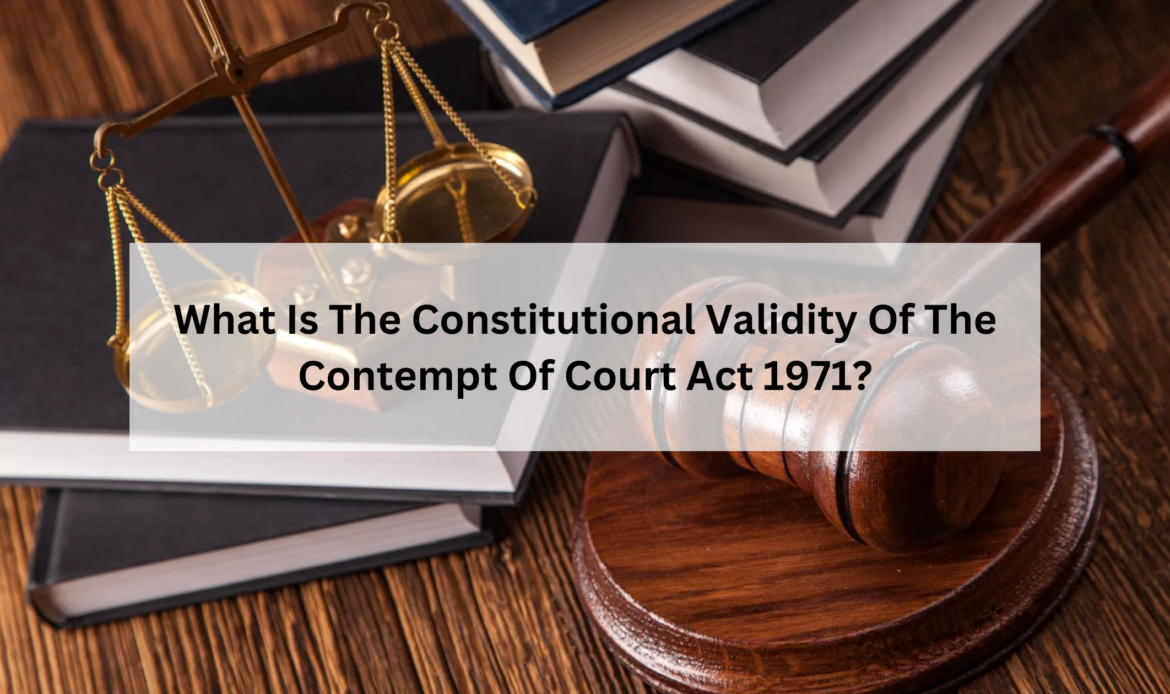Have you ever wondered why courts command such respect and authority? What happens if someone disobeys a court order or disrespects a judge? Well, the Contempt of Court Act, 1971, addresses these issues in India.
This law ensures that the judiciary remains a powerful pillar of democracy. But is it fair? Does it limit our freedom of speech? How does it fit within the Indian Constitution? Want to know about it in detail?
If yes, this blog is for you! In this blog, we’ll explore the constitutional validity of the Contempt of Court Act. Moreover, we’ll understand its impact on our rights and the justice system.
Contempt of Court: What Does It Mean?
First of all, let us make you familiar with the meaning of contempt of court. It refers to actions that disrespect the court’s authority. It comes in two forms: civil and criminal.
Civil contempt occurs when someone disobeys a court order. Criminal contempt includes acts that scandalize the court, prejudice judicial proceedings, or interfere with justice.
The Need for the Contempt of Court Act
The judiciary needs to command respect to function effectively. Without authority, courts cannot enforce their rulings or ensure justice. Yes, you heard it right!
The Contempt of Court Act, 1971, empowers courts to penalize those who undermine this authority. It acts as a shield, protecting the judicial process from disruptions and ensuring the rule of law.
Constitutional Validity: A Balancing Act
The Constitution of India guarantees freedom of speech under Article 19(1)(a). However, this freedom is not absolute. Article 19(2) allows reasonable restrictions for maintaining the integrity of the judiciary. The Contempt of Court Act operates within these limits, aiming to balance free expression and judicial respect.
Judicial Interpretations Of The Contempt Of Court Act
Indian courts have repeatedly upheld the constitutional validity of the Contempt of Court Act. They emphasize the necessity of such laws to maintain public confidence in the judiciary. In the landmark case of C.K. Daphtary v. O.P. Gupta (1971), the Supreme Court stated that the Act is essential for preserving judicial integrity.
However, courts also recognize the importance of free speech. In Baradakanta Mishra v. Registrar of Orissa High Court (1974), the Supreme Court ruled that criticism of the judiciary must be fair and reasonable. The intent should be to highlight flaws constructively, not to undermine the court’s authority.
Criticisms and Concerns
Despite its importance, the Contempt of Court Act has faced criticism. Some argue that it stifles free speech and discourages legitimate criticism. The vagueness of terms like “scandalizing the court” can lead to misuse. Critics call for clearer definitions to prevent arbitrary interpretations.
Reforms and Recommendations
Several recommendations have been made to address these concerns. Legal experts suggest narrowing the definition of contempt. This would involve focusing on acts that directly obstruct justice.
Additionally, there is a call for a higher threshold for what constitutes contempt. This would protect robust, good-faith criticism of the judiciary.
Case Studies
We hope that now you are aware of the contempt of court act. Now, let’s tell you about some of the landmark cases related to it.
- Arundhati Roy’s Case (2002)
Author Arundhati Roy faced contempt charges for her comments on the judiciary. The Supreme Court found her guilty, stating her remarks lowered the court’s authority. This case highlights the tension between free speech and judicial respect.
- Prashant Bhushan’s Case (2020)
Lawyer Prashant Bhushan tweeted about the Chief Justice of India. The Supreme Court convicted him of contempt, sparking a debate on judicial accountability and free expression. This case underscored the need for clearer guidelines on contempt.
The Way Forward
The Contempt of Court Act, 1971, remains crucial for maintaining judicial authority. However, its application must evolve with societal changes. Clearer definitions and higher thresholds for contempt can ensure it doesn’t infringe on free speech.
At the same time, the judiciary must remain open to constructive criticism. This balance will uphold both judicial respect and democratic values.
Final Words
The Contempt of Court Act, 1971, is a double-edged sword. It protects the judiciary’s authority but also risks curbing free speech. Its constitutional validity hinges on balancing these interests. Indian courts have upheld the Act’s necessity but have also emphasized fair and reasonable criticism. If you want any legal guidance with this act, contact the best law firm in Kolkata. At Kshetry and Associates, we offer the best legal services in Kolkata.

